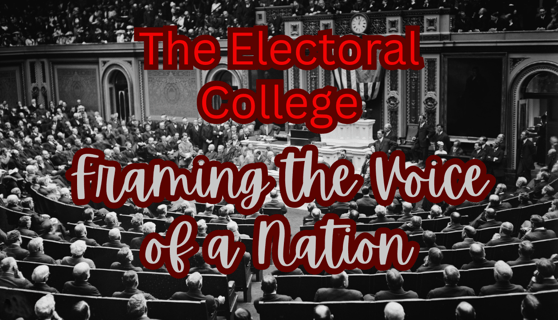"The Electoral College: Framing the Voice of a Nation"
The Electoral College stands as a distinctive and pivotal institution in the American electoral process. Since its inception, it has influenced presidential elections in profound ways. This comprehensive article digs into the origins, significance, and modern-day impact of the Electoral College, exploring its complex role in shaping the nation's political landscape.
Casey Adams
9/25/20233 min read


The Constitutional Foundation:
The framers of the U.S. Constitution, during the Constitutional Convention of 1787, grappled with the issue of how to elect the President.
Their goal was to create a system that balanced the will of the people with the interests of the states, particularly smaller states, and to avoid the potential pitfalls of direct democracy or legislative appointment.
The result was the Electoral College, a compromise enshrined in Article II, Section 1, Clause 2 of the Constitution.
How Does the Electoral College Work?
The Electoral College consists of 538 electors, and to win the presidency, a candidate must secure at least 270 electoral votes.
Each state is assigned a set number of electors equal to its representation in Congress—435 from the House of Representatives and 100 from the Senate.
Additionally, the District of Columbia, despite having no congressional representation, has three electors under the 23rd Amendment.
On Election Day, Americans cast their votes for their preferred presidential candidate, but they are technically voting for a slate of electors pledged to that candidate.
These electors then formally cast their votes for President and Vice President in December.
Congress certifies the results in early January, officially determining the next President of the United States.
The Winner-Takes-All System:
Most states operate under a winner-takes-all system, meaning that the candidate who wins the popular vote in a state secures all of its electoral votes.
This system can lead to a candidate winning the presidency without winning the national popular vote.
However, Maine and Nebraska use a proportional system, allocating electoral votes by congressional district and awarding two additional votes to the statewide winner.
Origins and Rationale:
The framers established the Electoral College for several reasons:
Practicality: In the 18th century, direct nationwide voting was impractical due to the size of the country, limited communication, and slow transportation.
Checks on Direct Democracy: The framers were wary of pure majority rule, fearing it could lead to mob rule or the election of a demagogue.
State Influence: The system ensures that smaller states have a voice in presidential elections, preventing large, populous states from dominating the process.
Compromise: It balanced power between slave-holding and non-slave-holding states, a critical issue at the time.
Challenges and Criticisms:
Despite its historical rationale, the Electoral College has faced persistent criticism:
Disproportionate Influence of Smaller States: Smaller states have a higher per-capita voting power compared to larger states, leading to claims that the system is unfairly skewed.
Popular Vote Discrepancies: On five occasions (1824, 1876, 1888, 2000, and 2016), a candidate has won the presidency despite losing the national popular vote.
Swing State Focus: Candidates primarily campaign in a handful of competitive "swing states," often ignoring states that reliably vote for one party.
Potential for Faithless Electors: Electors are not constitutionally bound to vote for the candidate they pledged to support, although most states have laws enforcing their commitment.
Amending or Abolishing the Electoral College:
Changing or eliminating the Electoral College would require a constitutional amendment, a formidable process. There are two ways to amend the Constitution:
Congressional Proposal: A two-thirds majority in both the House and Senate, followed by ratification from three-fourths (38) of the states.
Constitutional Convention: Called for by two-thirds of state legislatures, with any amendments requiring ratification by three-fourths of the states.
Due to the difficulty of constitutional amendments, alternative proposals, such as the National Popular Vote Interstate Compact (NPVIC), have gained traction.
This agreement between states would award their electoral votes to the national popular vote winner once enough states (totaling 270 electoral votes) joined the compact.
The Role of Faithless Electors:
Although electors are generally expected to vote according to their state’s results, "faithless electors" have occasionally voted differently.
While their impact has been minimal in past elections, faithless electors could theoretically influence a close race, raising concerns about the system’s reliability.
Some states have enacted laws to penalize or replace such electors, and the Supreme Court upheld these measures in Chiafalo v. Washington (2020).
Conclusion:
The Electoral College remains one of the most debated aspects of American elections.
Supporters argue that it preserves federalism, ensures smaller states retain influence and provides a stable electoral process.
Critics contend that it distorts representation, marginalizes the popular vote, and incentivizes disproportionate campaign focus on a few key states.
While efforts to reform or replace it continue, the Electoral College endures as a foundational component of the U.S. political system, reflecting both the ingenuity and the challenges of the nation's constitutional framework.
References:
Amar, Akhil Reed. "The Troubling Reason the Electoral College Exists." Time, 2016.
Edwards III, George C. "Why the Electoral College Is Bad for America." Yale University Press, 2004.
Keyssar, Alexander. "Why Do We Still Have the Electoral College?" The Atlantic, 2012.
Amar, Akhil Reed. "The Case for Abolishing the Electoral College." The New York Times, 2019.
National Archives. "The Constitutional Convention of 1787."



